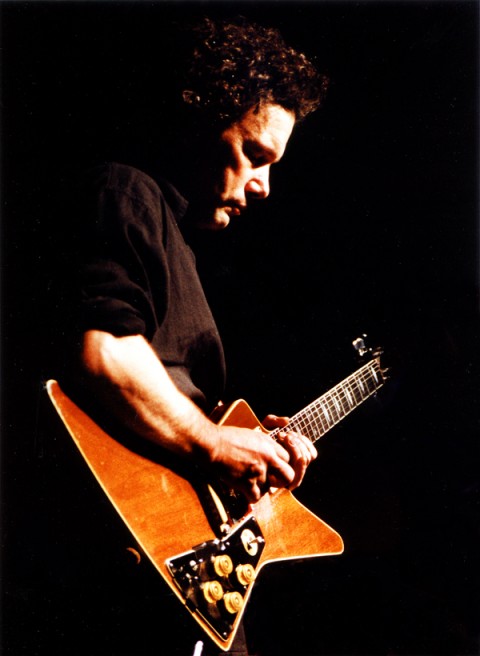Crazy engines and guitar malfunctions
It began when Steve Kimock first heard a violin and ran like hell in the opposite direction.
Kimock was a 12-year-old boy in Bethlehem, Pennsylvania with a vague yearning to create music. Somebody told him he should play violin, and one day he learned that another kid was practicing violin at a house in the neighborhood. He remembers clearly climbing the porch steps and encountering a malicious cacophony of violin notes. His reaction was instantaneous. He fled, and never looked back.
“It scared the hell out of me,” Kimock said.
His next musical stop was Aunt Dottie’s house. She was an old folk musician who had all kinds of stringed things, and Kimock became thoroughly enamored of the free-wheeling musicality alive in Dottie’s household. When a cousin returned from military service and gave him a lesson on guitar, he’d found his calling. He bought a beat-up acoustic for 10 bucks and never stopped playing.
“Here’s the scary part,” Kimock said. “That guitar had a trapeze style tail piece and a floating bridge so you could move the bridge back and forth. So this is my first guitar and of course the bridge will be in the wrong place because it’s floating and I don’t know how to tune it, so it’s just going to be impossible to play…I just tuned it until it sounded pretty when I strummed across it and then hit the strings and slid the trapeze tail piece back and forth. And that’s kind of still exactly what I’m doing today, mostly playing steel. So I’ve been playing with that same thing, kind of guitar malfunction, since the very first day.”
Guitar malfunction has served him well. He left home while still a teenager and began a never-ending musical journey that has led him around the world as one of the more revered, so-called “jam band” guitarists alive.
“I walked out of the house as a teenager and said, ‘I’m just gonna play my guitar’” Kimock said. “Literally, I didn’t care if I had a place to live or if I was in the street or if I had anything to eat, I just played.”
His life in the subsequent four decades has been a wandering exploration of tone and groove. Relix magazine has called him “the guitar monk.” He emerged as a key player in the San Francisco music scene in the mid-1970s. Grateful Dead bandleader Jerry Garcia dubbed Kimock his “favorite unknown guitar player” after the two players crossed musical paths. Kimock would later play in the influential Bay Area jam band Zero for almost two decades while also serving stints in Bob Weir’s Kingfish and in other post-Dead ensembles such as The Other Ones and Phil Lesh and Friends.
Kimock knows a thing or two about putting together a groove, and his newest project, Crazy Engine, is a particularly well-constructed quartet. He enlisted the legendary Melvin Seals – who played two decades in the Jerry Garcia Band – on Hammond B-3. “Everything with Melvin is always just right,” Kimock said. “And there is nothing that makes a guitar sound better than a Hammond organ.”
On bass, he scored another coup – Trevor Exter, a prodigiously talented cellist from the New York indie music scene, happily signed up to do some thumping. “He’s just cutting loose,” Kimock said. “He really works it.”
Finally, on drums, Kimock is ecstatically playing with his own son, John Morgan Kimock. “You know, he’s been around this music since he was about two years old, so it’s really more natural to him than anyone,” Kimock said. “It has just been amazing. He kicks my ass. He pushes me.”
“There’s a chemistry there that’s unlike anything else. He’s played with me a bunch in the last couple years in different projects, and I just love playing with him, nothing has ever made me as happy as my first born son being that into music; because he loves it, and I love him, and it’s just the coolest thing to get to play with him.”
Kimock said he doesn’t think of his many musical combinations as bands so much as friends communicating. And his own role a guitar player, he said, is just one link in a long chain.
“When I’m done, when my plane goes down in a cornfield or I seize up in the middle of some slow blues song, whenever, however I’m out of here, all I want there to be is maybe a little bit more good guitar music in the world,” he said. “And if you think about it, the way music is transmitted down the generations, from player to player, there’s this body of knowledge based on these aesthetic decisions and based on our shared humanity and reaction and response to sound, it’s unbroken since the very first sustained pitch, however far back that goes – 50,000 years or something. From person to person, this thing just gets carried forward. It’s the coolest thing we’ve got, we’ve carried it the entire time, cooler than any language and bigger than any of the sciences, it’s this huge human endeavor that just keeps on going in this very natural way. And if somebody tosses you that ball when you’re little and you carry it to the edge and then you pass it, then you’re part of this unbroken line all the way back, bringing this experience forward. If there’s a legacy thing, that’s it in a nut shell: I did my bit to carry my part as far as I could.”
Steve Kimock: Crazy Engine play Saint Rocke April 23.


